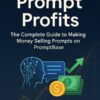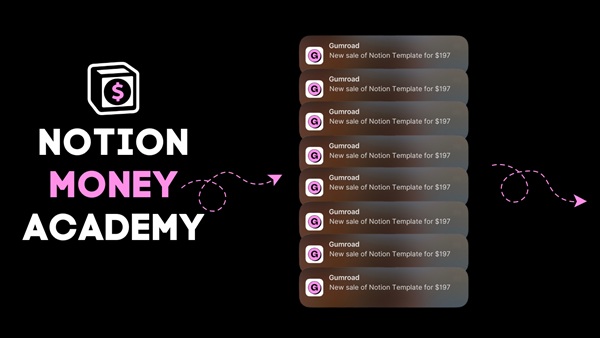No products in the cart.
Notion Money Academy – Creator Pascal
$997.00 $32.00
- Payment method: I will send the payment link to your email.
- Deliver by: Google Drive, Mega.nz
Category: Marketing
The Notion Money Academy emerges as a beacon for aspiring digital entrepreneurs, promising a pathway to financial independence through the burgeoning market of Notion templates.
Table of Contents
Notion Money Academy
The Notion Money Academy, conceptualized and launched by Creator Pascal, presents itself as a groundbreaking opportunity for individuals seeking to transform their financial landscapes in 2024. At its core, the program focuses on creating and selling digital products, specifically Notion templates, leveraging the immense popularity and adaptability of the Notion platform. Pascal asserts that this business model remains largely “untapped,” offering a unique advantage in a crowded online marketplace. The curriculum promises to guide participants from foundational Notion knowledge to advanced marketing strategies, aiming to equip them with the skills to achieve substantial monthly income. It’s positioned not as a fleeting novelty but as a sustainable, high-profit venture built on personal responsibility and diligent effort, contrasting starkly with typical get-rich-quick schemes that often flood the digital space.
The Untapped Business Model Explained
The central tenet of the Notion Money Academy revolves around identifying and capitalizing on the niche of Notion template creation and sales. Pascal meticulously argues that this sector represents an overlooked frontier within the vast digital economy. Notion, affectionately termed “The Lego of Productivity,” boasts over 100 million users globally, creating an enormous potential customer base eager for solutions that enhance their productivity, organization, or specific workflows. The brilliance of this model lies in its simplicity: one designs a valuable, pre-built Notion template once, and it can then be sold repeatedly to an infinite number of customers. This contrasts sharply with service-based businesses that require continuous client acquisition and delivery, or physical products that demand inventory management, shipping logistics, and associated overheads.
Pascal’s assertion regarding the “untapped” nature of this market invites closer scrutiny. While the concept of selling digital products is not new, the specific focus on Notion templates, combined with the comprehensive strategy for audience building and direct sales without paid ads, forms the “secret sauce” Pascal claims to reveal. The perceived lack of widespread discussion around this specific model from top-tier creators is presented as a competitive advantage for early adopters. This perspective challenges conventional wisdom, suggesting that opportunities still exist even within a seemingly saturated online world, provided one possesses the right knowledge and execution framework. It’s an intriguing proposition that hinges on the idea of niche specialization combined with broad market access.
The inherent flexibility of Notion allows for an almost limitless array of template types – from project management dashboards and personal finance trackers to content calendars and habit builders. This diversity means creators can cater to highly specific needs, cultivating a loyal customer base. The “untapped” label thus also speaks to the potential for niche innovation within the Notion ecosystem, encouraging creators to develop unique solutions rather than replicate existing ones. The Notion Money Academy positions itself as the definitive guide to navigating this landscape, providing the tools and strategies to uncover these hidden opportunities and convert them into tangible revenue streams. The emphasis is on creation, value delivery, and efficient monetization, bypassing many traditional entrepreneurial hurdles.
High-Profit Margins and Scalability
One of the most compelling advantages touted by the Notion Money Academy is the exceptionally high-profit margins associated with selling digital products. Pascal claims, “Selling digital products is literally one of the only business models that lets you have 90% profit margins.” This figure, if accurate and consistently achievable, signifies an extraordinary level of profitability, far exceeding most traditional businesses which are burdened by the costs of goods sold, inventory, and operational overheads. The implication is clear: what you earn, you largely keep. This economic efficiency is a powerful motivator for aspiring entrepreneurs, promising a faster path to financial independence and a significantly higher return on investment for their efforts.
The rationale behind these remarkable margins is straightforward: once a Notion template is created, the cost of reproducing and distributing it is virtually zero. There’s no physical product to manufacture, no shipping fees, and no inventory to manage. The initial time and effort invested in designing the template become a fixed cost, which is then amortized over an indefinite number of sales. This “create once, sell forever” paradigm is central to the program’s value proposition for scalability. Unlike service-based businesses where income is directly tied to hours worked, digital products allow for exponential growth without a proportional increase in effort. A well-received template can generate passive income while the creator focuses on new projects, marketing, or simply enjoying their newfound freedom.
Furthermore, the scalability of this model is not just about limitless sales; it’s also about a lean operational structure. The data highlights that the business can be run without needing a physical store, complex shipping setups, or even employees. This independent, solopreneurial approach removes significant management headaches and financial outlays that plague many startups. The ability to generate income with “0 followers initially” and the anecdote of making “$200 made on first day with 50 Twitter followers” directly underlines the potential for rapid initial validation and growth, even without an established audience or the need for paid advertising. This emphasis on organic reach and inherent product value underscores the model’s low barrier to entry and high potential for return.
Ultimately, the promise of 90% profit margins and boundless scalability positions the Notion template business as an attractive alternative to conventional business models. It suggests that financial success can be achieved through efficiency, smart product development, and leveraging digital distribution channels, rather than through large capital investments or extensive logistical operations. For individuals looking to maximize their earning potential while minimizing risk and overhead, this aspect of the Notion Money Academy is undoubtedly a major draw. It paints a picture of a business truly designed for the digital age, where intellectual property, once created, becomes an enduring asset capable of continually generating significant revenue.
The Comprehensive Training Framework
The Notion Money Academy prides itself on delivering a holistic and exhaustive educational experience, designed to take participants “from $0 to $10K/month Notion Creator.” This ambitious promise is backed by a robust course structure that spans over 7 courses and includes more than 500 modules, supplemented by a suite of extra bonuses and crucial lifetime access to the Skool community. The sheer volume of content suggests a deep dive into every facet of the Notion template business, from the absolute basics of using Notion itself to advanced strategies for marketing, sales, and personal branding within the digital space. It aims to leave no stone unturned in preparing its students for success.
The core curriculum is broken down into thematic “Bibles,” each dedicated to a critical aspect of building and scaling a Notion template business. These include:
- The Notion Money Bible
- The Notion Bible
- The Twitter Bible
- The Sales Bible
- The Producthunt Bible
- The Threads Bible
- The Instagram Bible
This comprehensive breakdown indicates a multi-faceted approach to online business building. “The Notion Bible” presumably covers core Notion skills, ensuring even complete novices can master the platform. “The Notion Money Bible” would then delve into the monetization strategies specific to templates. Crucially, the inclusion of “The Twitter Bible,” “The Threads Bible,” and “The Instagram Bible” highlights Pascal’s emphasis on organic audience growth and content marketing, focusing specifically on building a “faceless” brand on platforms like Twitter. This unique selling proposition – the ability to succeed without personal exposure – is a significant draw for those hesitant about public-facing online ventures.
Beyond the structured courses, the academy offers a collection of bonuses designed to further enhance the learning journey and accelerate results. These include Advanced Resources like AI prompts and templates, practical tools like a Producthunt OS and Testimonial Architect, and even resellable templates that students can utilize or learn from. The Workshops & Live Calls provide opportunities for direct engagement and real-time problem-solving, while the Lifetime Skool Access to a private community fosters motivation, accountability, and peer support. This ecosystem of learning, practical tools, and ongoing community interaction is intended to provide a complete support system for individuals embarking on their entrepreneurial journey. Pascal’s direct access within the community for questions reinforces the personal touch and commitment to student success, attempting to justify the program’s cost by offering sustained value and mentorship beyond the initial content delivery.
Creator Pascal
Creator Pascal stands as the central figure and testament to the effectiveness of the Notion Money Academy‘s principles. His personal transformation from a “9-5 income” earner to a highly successful full-time digital creator is foundational to the program’s credibility and aspirational appeal. Pascal’s journey is not just a narrative; it’s presented as tangible proof of concept, demonstrating that the very strategies taught within the academy are those he rigorously applied to achieve remarkable financial and lifestyle freedom. His achievements—including significant monthly revenue, a substantial social media following, and a life of location independence—serve as the ultimate endorsement for the “untapped business model” he advocates. The decision to share his “secrets” is framed not as self-sabotage, but as an act of genuine belief in the abundance of online opportunities for everyone.
From 9-5 to Digital Nomad – Pascal’s Journey
Pascal’s personal story is woven deeply into the fabric of the Notion Money Academy, serving as both inspiration and empirical evidence for the program’s efficacy. He openly shares his trajectory: in less than six months, he not only replaced his conventional “9-5 income” but surpassed it significantly with online earnings derived primarily from digital products, specifically Notion templates. This rapid transition allowed him to quit his job and embrace the life of a full-time creator. His reported achievements are striking: consistently making more than $20,000 per month in recurring revenue, accumulating over 250,000 social media followers (including 107,000+ on Twitter alone), and generating over $260,000 in total revenue from his Notion templates. These figures are not just aspirational; they are presented as achievable milestones using the very blueprint provided in the academy.
His transformation extends beyond mere financial metrics to illustrate a complete lifestyle overhaul. Pascal frequently highlights his ability to “work for myself,” his residency in “Dubai, tax-free,” and the significant portion of his time spent “traveling the world” while only committing “a few hours a day from [his] laptop.” This narrative paints a picture of ultimate freedom – financial, geographical, and temporal. It’s the dream of many modern entrepreneurs: decoupling income from location and time commitment. The specific example of quitting his 9-5 job after just six months of selling templates reinforces the program’s promise of rapid results for dedicated individuals. This aspect of his journey is leveraged to underscore the program’s potential to fundamentally alter one’s quality of life, moving beyond the constraints of traditional employment.
Pascal’s journey is not merely a tale of success, but also a strategic component of his marketing. By showcasing his own tangible results, he instills confidence and belief in prospective students, providing a clear vision of what’s possible. The emphasis on his personal “hard work” and “personal responsibility” counters any perception that this is a “get-rich-quick scheme,” despite the rapid and substantial gains he describes. His story serves as a living testimonial, aiming to prove that the Notion Money Academy offers a legitimate and proven path to digital entrepreneurship. It encourages aspiring creators to view his achievements not as extraordinary exceptions, but as attainable outcomes for those willing to commit to the strategies he teaches.
Differentiating from Saturated Markets
Creator Pascal dedicates significant effort to positioning the Notion template business model, and by extension, the Notion Money Academy, as fundamentally distinct and superior to other popular online ventures that he deems “saturated.” This strategic differentiation is crucial for attracting individuals disillusioned with or unsuccessful in more widely discussed online hustles. Pascal explicitly states that his model is “Not SMMA/Agency, IG theme pages, YouTube automation, networking marketing, Forex, crypto, or trading.” This curated list represents highly competitive and often complex industries where success can be elusive, capital requirements high, or regulatory hurdles significant. By contrast, the Notion template business is presented as a breath of fresh air in an otherwise stifling digital landscape.
The core argument for differentiation hinges on several key advantages of selling Notion templates. Firstly, the absence of physical inventories, stocks, or complex shipping logistics immediately sets it apart from e-commerce models. This eliminates capital-intensive upfront investments and the headaches of supply chain management. Secondly, the previously highlighted 90% profit margins are a direct consequence of digital product nature, a rarity in most business sectors. This allows creators to retain a far larger share of their revenue, accelerating profitability. Thirdly, the concept of building a product “once and sell it forever” highlights the scalable, passive income potential, contrasting with service-based models that demand continuous client work and cold outreach, which many entrepreneurs find exhausting and unfulfilling.
Moreover, Pascal emphasizes the low barrier to entry and operation, stating that the model “Can be done without paid ads, showing your face, or prior knowledge/experience.” The ability to start and scale a successful business without upfront advertising costs, personal public exposure, or pre-existing expertise is a powerful lure for newcomers to the online space. The narrative that one can “generate income with 0 followers initially” further dismantles perceived barriers, reinforcing the idea that success is rooted in the value of the product itself and the strategic application of free marketing techniques, predominantly on platforms like Twitter. This deliberate framing seeks to convince prospective students that the Notion template business is not just another fleeting trend, but a genuinely viable, accessible, and less competitive path to sustainable online income, devoid of the common frustrations associated with more saturated online industries.
The No-Refunds Philosophy and Mindset
A prominent and potentially controversial aspect of the Notion Money Academy is its ironclad “No Refunds Policy.” Pascal unequivocally states, “I guarantee there’s no guarantee or refunds for Notion Money Academy. None. Nada. Zilch.” This stark declaration is not merely a legal stipulation; it’s presented as a core philosophical stance, designed to filter out individuals who may not be genuinely committed to the rigorous demands of entrepreneurship. Pascal explicitly justifies this policy as a means to prevent “freeloaders” and to ensure that only serious, dedicated individuals become part of his community. This approach places the onus entirely on the buyer, demanding a high level of commitment and personal responsibility from the outset.
From Pascal’s perspective, the “no refunds” policy serves as a powerful psychological barrier, separating those genuinely ready to put in the “hard work” from those merely seeking a “get-rich-quick scheme.” He views it as a necessary filter for “people who I don’t want to work with,” suggesting that hesitancy or the expectation of a safety net indicates a lack of the entrepreneurial mindset necessary for success. This mirrors the ethos often found in high-ticket coaching programs and exclusive masterminds, where significant upfront investment is seen as a commitment device, compelling participants to take the material more seriously and apply themselves fully, knowing there’s no turning back. It’s a bold move that consciously risks alienating some potential buyers but aims to attract an elite, highly motivated cohort.
However, from the perspective of a potential buyer, such a policy merits significant consideration and careful due diligence. It places all the risk squarely on the student, requiring them to have absolute faith in the program’s value proposition and Pascal’s expertise before making the investment. While Pascal frames it as emphasizing “commitment and personal responsibility,” it also means that if a student finds the program does not meet their expectations, or if their personal circumstances change, there is no recourse. This policy implicitly challenges the student to adopt a “burn the boats” mentality, forcing them to commit fully and rely on their own grit and the course material to succeed. It’s an unusual but deliberate strategy that aims to cultivate a resilient and self-reliant community, aligning with the program’s overall message that success is earned through persistent effort, not through guarantees or shortcuts. The policy, while stringent, effectively communicates the program’s expectation of unwavering dedication from its participants.
Conclusion
The Notion Money Academy, led by Creator Pascal, presents a compelling blueprint for achieving financial freedom through the creation and sale of Notion templates, offering high-profit margins and location independence. The program distinguishes itself from saturated online markets by emphasizing a lean, scalable business model that requires minimal initial investment, no prior experience, and can be built without showing one’s face. While Pascal’s impressive personal results serve as a powerful testimonial, the academy’s stringent no-refund policy underscores a strong emphasis on personal responsibility and a “hard work” ethos. It promises comprehensive training and community support, positioning itself as a transformational path for aspiring digital entrepreneurs seeking to build an authentic and profitable online business.
Sales Page:_https://pascio.gumroad.com/l/thenotioncreatorbundle
Be the first to review “Notion Money Academy – Creator Pascal” Cancel reply
Related products
$25.00
$19.00
$49.00
$39.00












Reviews
There are no reviews yet.